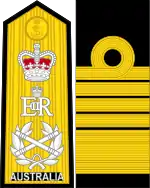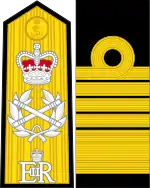Admiral of the fleet
An admiral of the fleet or fleet admiral (equivalent rank to admiral of the navy or grand admiral) is a military naval officer of the highest rank. In many nations the rank is reserved for wartime or ceremonial appointments. It is usually a rank above admiral (which is now usually the highest rank in peacetime for officers in active service), and is often held by the most senior admiral of an entire naval service.
| Naval officer ranks |
|---|
| Flag officers |
| Senior officers |
| Junior officers |
It is also a generic term for a senior admiral in command of a large group of ships, comprising a fleet or, in some cases, a group of fleets. If actually a rank, its name can vary depending on the country. In addition to "fleet admiral" and "admiral of the fleet", such rank names include "admiral of the navy" and "grand admiral".[note 1]
It ranks above vice admiral, rear admiral and usually full admiral, and is usually given to a senior admiral commanding multiple fleets as opposed to just one fleet. It is often classified in NATO nations as a five-star rank.
Admiral of the fleet is equivalent to an army field marshal. It is also equivalent to a marshal of the air force which in many countries has a similar rank insignia to admiral of the fleet.
Etymology
The title admiral of the fleet can trace its origins to the Middle Ages, where the title was typically granted to a nobleman who was appointed by a monarch to raise and command a navy for a specific campaign.
Usage in specific countries
The following articles contain specific information on the rank as it pertains to individual countries:
- Admiral of the fleet (Australia)
- Admiral flote (Croatia)
- Admiral of the fleet (Russia)
- Admiral of the fleet (Soviet Union)
- Admiral of the Fleet of the Soviet Union
- Chom phon ruea (Thailand)
- Admiral flote (Socialist Federal Republic of Yugoslavia)
- Admiral of the fleet (United Kingdom)
- Fleet admiral (United States)
- Admiral of the Navy (United States) (1903-1917)
Ambiguity exists when translating the French amiral into English (into admiral of the fleet or admiral). A French title of amiral de la flotte, outranking a full admiral was created in 1939 for Darlan, who was the only person in French history to hold that title. Amiral de la flotte became a rank in 1942, when Darlan was commander in chief of the military forces of the Vichy Regime. The rank of Amiral de la flotte was still mentioned in French laws in 1957.[1]
Before the fall of the monarchy in 1952, the Egyptian Navy had the equivalent rank of sayed elbehar elazam.
In the Turkish Navy, the corresponding rank büyük amiral, literally meaning "grand admiral", can only be bestowed by the National Assembly, and only given to an admiral who leads the navy successfully in and out of a war, criteria tougher than those for equivalent ranks. No one has ever been bestowed this rank yet in the republican era. During the period of the Ottoman Empire, commanders of the navy carried the rank of kapudan-i derya as equivalent.
Poland
In Poland, the rank is the second-highest and is a 3-star rank. The stars are not used, however, except in the very admiral's flag.
Gallery




_OF-10.svg.png.webp) Admiral of the fleet
Admiral of the fleet
(Indian Navy)





 Admiral of the Fleet
Admiral of the Fleet
(Royal Navy) Fleet admiral
Fleet admiral
(United States Navy)
Other countries
The rank also exists or has existed (never conferred to any individual) in Bangladesh, India, Indonesia, Nigeria, Oman and Pakistan, although not all of these countries have actually bestowed the rank on an individual.
Notes
- In some navies, however, such as the German Kriegsmarine during World War II, "admiral of the navy" has been considered a higher rank than "admiral of the fleet" or its equivalent.
References
- Le Hunsec, Mathieu (2012-03-15). "L'amiral, cet inconnu". Revue historique des armées (in French) (266): 91–107. ISSN 0035-3299.
- "Badges of rank" (PDF). defence.gov.au. Department of Defence (Australia). Retrieved 31 May 2021.
- "Oznake činova". osrh.hr (in Croatian). Republic of Croatia Armed Forces. 1 April 2019. Retrieved 26 May 2021.
- "Pangkat". mafhq.mil.my (in Malay). Malaysian Armed Forces. Archived from the original on 29 April 2020. Retrieved 4 June 2021.
- Smaldone, Joseph P. (1992). "National Security". In Metz, Helen Chapin (ed.). Nigeria: a country study. Area Handbook (5th ed.). Washington, D.C.: Library of Congress. pp. 296–297. LCCN 92009026. Retrieved 21 October 2021.
- "Badges of Rank". nzdf.mil.nz. New Zealand Defence Force. Archived from the original on 3 July 2020. Retrieved 11 June 2021.
- "TÜRKMENISTANYŇ KANUNY Harby borçlulyk we harby gulluk hakynda (Türkmenistanyň Mejlisiniň Maglumatlary 2010 ý., № 3, 58-nji madda) (Türkmenistanyň 01.10.2011 ý. № 234-IV Kanuny esasynda girizilen üýtgetmeler we goşmaçalar bilen)" [LAW OF TURKMENISTAN On military service and military service (Information of the Mejlis of Turkmenistan, 2010, No. 3, Article 58) (as amended by the Law of Turkmenistan of October 1, 2011 No. 234-IV)] (PDF). milligosun.gov.tm (in Turkmen). Ministry of Defense (Turkmenistan). pp. 28–29. Retrieved 2 June 2021.
- Francis E. McMurtrie and Raymond V.B. Blackman (editors), Jane's Fighting Ships 1949-50. New York: The McGraw-Hill Book Company, Inc., 1949.